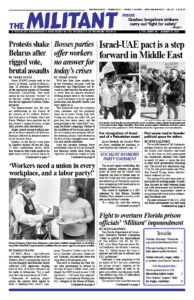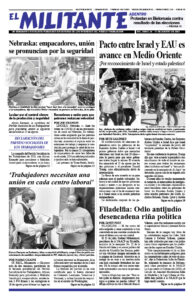The Florida Department of Corrections Literature Review Committee “voted to uphold the impoundment of ‘The Militant, Vol. 84, No. 30,’” LRC chair Dean Peterson wrote David Goldstein, the Militant ’s attorney, Aug. 17, “which means the issue is rejected and will not be allowed into FDC institutions.”
Goldstein is now preparing to file an appeal of this decision, protesting the prison system’s violation of the constitutional rights of both its inmate-subscribers and the paper itself. The Militant has over 50 subscribers behind bars in Florida.
The article in that issue that aroused the ire of censors at Florida State Prison in Raiford is entitled, “Prisoners Demand Release from Overcrowded Jails.” It is a news report on efforts in California to press for the release of inmates in the overcrowded state prison system, where over 5,800 inmates statewide have contracted COVID-19.
Prison authorities — and now the Review Committee — claim, “The publication is dangerously inflammatory in that it advocates or encourages riot, insurrection, rebellion, organized prison protest, disruption of the institution, or the violation of federal law, state law, or Department rules.”
Supporters of political rights have begun calling on the Literature Review Committee, which will hear the appeal against its own ruling, to overturn the ban.
The “impoundment notice does not explain why the article would cause a riot and common-sense suggests this is far-fetched,” Benjamin Stevenson wrote on behalf of the Florida American Civil Liberties Union. “It’s nothing new to Florida prisoners that prison conditions have deteriorated during the COVID-19 pandemic and that other prisoners are naturally upset about this. Instead, the censorship appears to be a pretext to ban the Militant.”
The Reporters Committee for Freedom of the Press, a well-known nationwide organization of media representatives, wrote that the group “strongly urges the Literature Review Committee to overturn the impoundment.”
“Prisons should not invoke facially legitimate but overly broad justifications — such as concerns about riot and insurrection — to censor content, particularly when doing so deprives inmates of valuable information about how a deadly disease may affect them,” the committee wrote.
Advocating “organized prison protest” is a new criteria for banning publications, added by Florida prison officials just this June. Previous impoundments of the Militant for reporting on prison protests have not been upheld.
The Militant has gone through a number of fights over efforts by Florida prison authorities to deprive inmate-subscribers their paper, especially in the last few years. The paper has succeeded in overturning a large majority of these bans, including when the issue involved was reporting on protests by prisoners. Among these articles were Militant coverage of the hunger strike over conditions in the California prison system in 2013 that involved tens of thousands of inmates, as well as a 2016 work stoppage by prisoners in Alabama.
The impoundment notice for Militant no. 30 cites the article about a rally in Sacramento, California’s capital, demanding the state government take action to relieve overcrowding. It includes reporting on a hunger strike by inmates at San Quentin who tested positive for COVID-19 and are seeking better conditions and health care.
“The conditions confronting prisoners in California — and elsewhere — are of serious interest to working people, both in and out of jail,” Militant editor John Studer said Aug. 18. “Moves by prison authorities anywhere to bar news about these conditions, and efforts to alleviate them, should be stopped.
“Workers behind bars are legally entitled to receive and read newspapers, whatever their political view, to form their own opinions about political questions and to exercise their constitutional right to ‘petition the government for a redress of grievances,’” Studer said. “Constitutionally guaranteed freedom of the press also means we have the right to send the paper to our subscribers.
“Stories about prison conditions, the disaster created for all working people by the capitalist for-profit medical system in the U.S. today, and efforts to change them are covered by hundreds of media almost daily,” he said. “Florida prison authorities’ move to bar the Militant ’s coverage — its viewpoint — is a threat to political rights and should be overturned.”
Studer urged all those concerned about the rights of workers behind bars and freedom of the press to write to the Literature Review Committee asking that it overturn the impoundment.
Send letters to Dean Peterson, Literature Review Committee, Florida Department of Corrections, 501 South Calhoun Street, Tallahassee, FL 32399, or via email at Allen.Peterson@fdc.myflorida.com, with copies to the Militant.
“Join us in this fight,” Studer said. “Tell your co-workers, your church members, your union and those you do politics with, ask them to join in sending a letter.”

